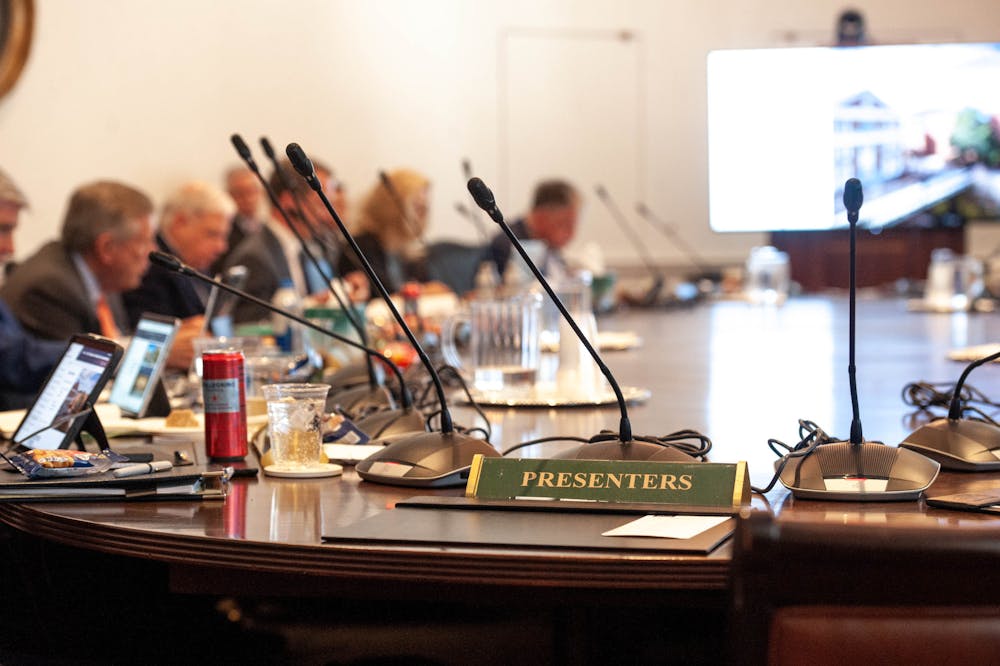The Board of Visitors’ Advancement Committee discussed the success of the Honor the Future campaign during their meeting Thursday. The campaign, which supports the University’s academic programs and capital projects, surpassed the University’s $5 billion fundraising goal Dec. 22, reaching a total of $5.1 billion through Feb. 19. This number puts the campaign — which intended to reach the $5 billion mark by July 2025 — well ahead of its initial projections.
The Office of Advancement is responsible for fundraising and organizing a variety of University programs including global initiatives, scholarship support and annual giving. The Committee’s Honor the Future campaign began with its soft launch in 2017, and has been exceptionally successful in raising funds over the last seven years.
In a statement to U.Va. Today, President Jim Ryan said that the campaign’s success was a crucial step in the University’s 2030 plan — the goal of becoming the best public university by the year 2030.
“$5 billion is much more than simply a number,” Ryan said. “It represents critical investments in students, faculty and research that align with the 2030 Strategic Plan, which will have an impact for generations.”
The project remains incomplete, however, as certain sectors, including the Batten School of Leadership and Public Policy and the health system, are still below their individual fundraising targets. Some, including the School of Engineering and Applied Science and the College at Wise, had not yet reached 80 percent of their goal as of Feb. 19. A surplus in donations towards units like the Darden School of Business, the School of Nursing and the Alumni Association, however, has propelled the total above $5 billion.
Vice President for Advancement Mark Luellen said that despite having reached their overall goal, the Committee did not plan to slow progress on the Honor the Future campaign.
“It's been really heartwarming and humbling to see that things didn't stop once we hit five,” Luellen said. “It's something we're not slowing down. We're going to continue to push forward as hard as we can.”
Peter Grant II, volunteer chair of Honor the Future, said the campaign was an ambitious project but that he found success in choosing a target for each sector individually before determining the overall fundraising goal, rather than the traditional top-down method dividing a set sum among different groups.
“One of the things I point to [as a key to success] is a different approach for this campaign,” Grant said. “[We established] goals by the schools, units and foundations… There was an extensive body of work put into at each of these schools and units, and it builds from the bottom up of what their campaign goals would be … and where [those funds] would be successful.”
As of Dec. 31, the philanthropic cash flow — the value of actual cash or cash-equivalent gifts received by the University for philanthropic purposes — for fiscal year 2024 stands at $232 million. According to the Advancement Committee, which Chair L.F. Payne affectionately referred to as the “good news committee,” this value marks an 8.3 percent increase from the previous year.
The total current and anticipated commitments for the 2024 fiscal year, which include both funding from new gifts and private grants as well as potential upcoming donations, amounted to $383 million as of Dec. 31. This represented an increase of over 25 percent from the previous fiscal year. The Committee also noted a two percent increase in undergraduate alumni participation in donations, 13 percent increase in visits to Grounds and a 40 percent increase in the number of gifts over $1 million dollars.
Ryan also announced two donations to the University. A $25 million gift made by the Harrison Foundation will go towards the creation of the Harrison Family Olympic Sports Center, a state-of-the-art performance training center that is slated to open in the summer of 2025. A $30 million gift from the Harrison Foundation and the Mary Anderson Harrison Foundation will create the Harrison Family Research Center, a new research center targeting Alzheimer's and neurodegenerative diseases.
The $30 million gift will be put towards three areas — $20 million towards the research center, which will be located within the under-construction Manning Institute of Biotechnology, $5 million towards a new professorship in neuroscience and $5 million towards additional staff and research.
The Advancement Committee will reconvene when the Board of Visitors meets again in June.







